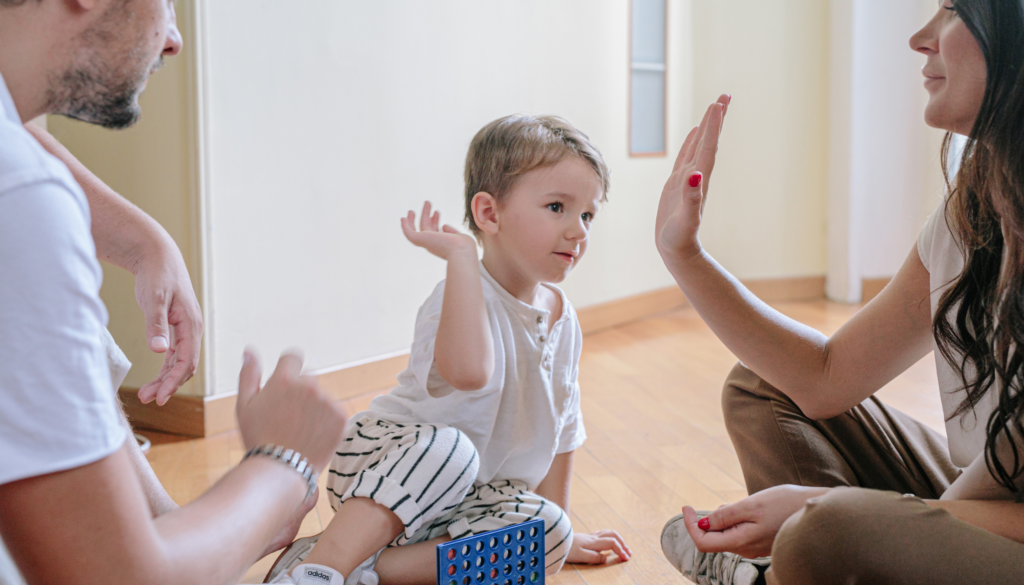Raising Emotionally Resilient Kids: What Our Kids Truly Need from Us as Parents
As parents, we’ve all been there—moments when frustration takes over, and we label our children as stubborn, dramatic, grumpy, or even a “drama queen.” These labels often slip out in times of exhaustion or overwhelm, as we try to make sense of their intense emotions. While labeling might feel like a way to regain control or explain their behavior, we may not realize the lasting impact these words can have on our children.
When kids repeatedly hear themselves labeled, they internalize these words as truths about who they are. Over time, their self-image begins to mirror the labels we give them. A child who’s called “stubborn” may come to believe that stubbornness defines them. This not only shapes their identity but also limits their ability to grow, adapt, and express emotions in healthier ways.
Let’s explore why moving beyond labels is crucial and what our children truly need from us to thrive.
The Power of Words: Shaping Self-Image
Words have extraordinary power, especially when they come from parents. We are our children’s most trusted mirrors. What we say about them becomes what they believe about themselves.
For instance, calling a child “difficult” doesn’t just describe their behavior in the moment—it sets a precedent for how they view themselves. Research in psychology confirms that children internalize the labels they hear and build their self-worth around them. Negative labels can lead to feelings of inadequacy and misunderstandings about their emotions, often resulting in behavior that matches the expectations those labels set.
Instead of labeling, we can shift our focus to the specific behavior or emotion. For example:
- Instead of “You’re so stubborn,” try, “I see you feel strongly about this, and I want to understand why.”
- Instead of “You’re being dramatic,” try, “I can see this is really upsetting for you. Let’s talk about it.”
This subtle but powerful change reframes the conversation, helping kids feel understood rather than judged.
Big Emotions, Not Drama
Children with intense emotions are not being dramatic for attention or trying to create chaos. They’re often overwhelmed by feelings they don’t yet know how to manage. Their behavior is not a reflection of their character but a signal of unmet needs.
When a child throws a tantrum or seems grumpy, it’s worth asking:
- Are they hungry or tired?
- Is something at school or home causing stress?
- Do they need help expressing feelings they can’t yet articulate?
For children, emotions can feel like tidal waves. Without the tools to navigate these feelings, they often act out in ways that seem dramatic to us. Instead of dismissing their behavior, we can guide them by naming and validating their emotions:
- “I see you’re really frustrated right now.”
- “It’s okay to feel upset. Let’s find a way to work through this together.”
By doing this, we help children develop emotional intelligence, showing them that emotions are normal and manageable—not something to be feared or suppressed.
Validation vs. Reinforcement
Validation doesn’t mean agreeing with inappropriate behavior. It means acknowledging the underlying emotion. For instance:
- If a child is throwing a tantrum over not getting a toy, dismissing them with “You’re being dramatic” only fuels the frustration. Instead, say, “I know you really wanted that toy. It’s hard to not get what we want, and it’s okay to feel upset.”
This approach validates their feelings without reinforcing the behavior. Over time, children learn to express emotions in healthier ways and develop the tools to manage disappointment or frustration.
The Gift of Time and Connection
More than labels, punishments, or quick fixes, what children need most from us is our time. In a world full of distractions—work, screens, and busy schedules—giving kids our undivided attention is the most valuable gift we can offer.
When we choose connection over correction, we strengthen the parent-child bond and foster trust. Time-outs or taking away privileges might seem effective in the moment, but they often leave kids feeling isolated and misunderstood. Instead, try these alternatives:
- Sit with them during emotional outbursts and help them process their feelings.
- Use calming techniques like deep breathing or grounding exercises.
- Engage in conversations that help them articulate what they’re experiencing.
Dr. Becky Kennedy, a renowned parenting expert, emphasizes that children who feel deeply need connection, not isolation. By being present and calm in their toughest moments, we show them they are safe and loved, no matter how overwhelming their emotions may be.
Fostering Understanding and Emotional Growth
When we move beyond labels and focus on understanding, we empower our children to understand themselves. We teach them that emotions are not something to be ashamed of but an integral part of being human.
Here’s how we can support their emotional growth:
- Ask Open-Ended Questions: Instead of assuming, ask, “What’s going on?” or “How can I help?”
- Model Emotional Regulation: Show them how to handle big feelings by staying calm and using positive coping strategies.
- Teach Emotional Vocabulary: Help them name their feelings—happy, sad, frustrated, excited—so they can better express themselves.
When we validate their experiences and provide guidance, we give them the tools to navigate life’s challenges with confidence and resilience.
In Conclusion: Love Beyond Labels
Our children need understanding far more than they need labels. They need parents who see beyond surface behaviors and take the time to understand the emotions driving them. They need to know their feelings are valid, their struggles are seen, and their parents are their safe haven.
Let’s choose words that build them up, not tear them down. Let’s replace “difficult” with “determined,” and “dramatic” with “expressive.” By doing so, we don’t just nurture their emotional well-being—we nurture a lifelong bond built on trust, connection, and unconditional love.
So, the next time your child is struggling, pause and remember: they don’t need a label. They need you—your time, your attention, and your understanding. Together, you’ll navigate the big feelings, and in the process, they’ll grow into confident, emotionally intelligent individuals.
Let’s give our kids what they truly need: love without limits and understanding without judgment.



